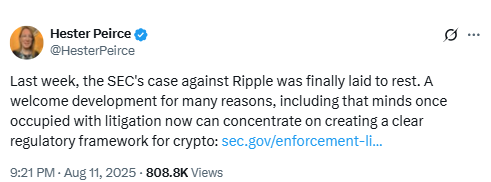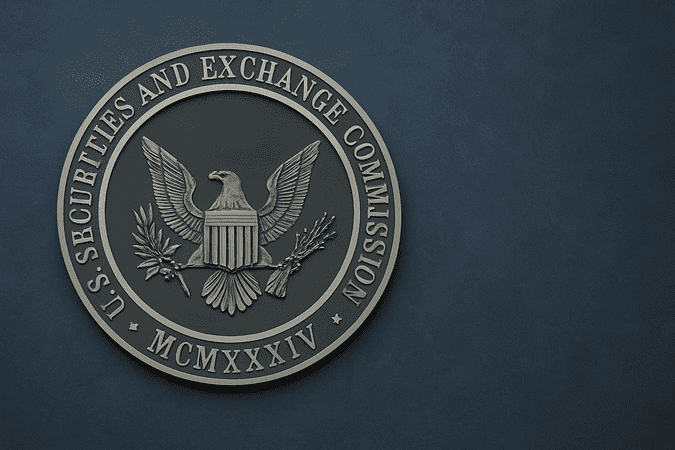The SEC lawsuit against Ripple Labs has officially ended after both sides agreed to drop their legal appeals.
The filing, made last Thursday with the Second Circuit Appeals Court, stated that each party would cover its own costs and fees.
The case began in December 2020 when the Securities and Exchange Commission alleged that Ripple raised $1.3 billion through unregistered XRP securities sales.
In July 2023, Judge Analisa Torres ruled that XRP was not a security in retail sales but was considered a security in institutional transactions.
In August 2024, Ripple paid a $125 million penalty, finalizing the main terms of the settlement. The case became one of the most prominent enforcement actions in the digital asset sector.
Paul Atkins and Hester Peirce Highlight Regulatory Shift
Following the case’s resolution, SEC Commissioner Hester Peirce wrote on X that the conclusion was a “welcome development” because it allows the agency to focus on SEC crypto regulations instead of litigation.

SEC Chair Paul Atkins replied, stating:
“With this chapter closed, we now have an opportunity to shift our energy from the courtroom to the policy drafting table. Our focus should be on building a clear regulatory framework that fosters innovation while protecting investors.”
Their remarks signal that US crypto policy discussions could now gain more attention within the agency, aligning with calls for defined digital asset regulation.
CLARITY Act Moves Forward in Congress
The end of the Ripple case comes as lawmakers advance the Digital Asset Market Clarity Act—known as the CLARITY Act.
The bill aims to outline how digital asset markets operate and establish boundaries for regulatory oversight.
Republican lawmakers and the Senate Banking Committee have set a target to pass the bill by September 30. However, there is opposition from Democratic Party members.
In July, leading Democrats in the House of Representatives announced their intent to block the legislation.
Maxine Waters, the ranking member of the House Financial Services Committee, criticized the bill and linked it to the Anti-CBDC Surveillance State Act, which would prohibit a US central bank digital currency.
Waters stated:
“[Republicans are] doubling down by fast-tracking a dangerous package of crypto legislation through Congress.”
Her comments illustrate the political divide on US crypto policy.
Legislative Debate and SEC Focus Intersect
The resolution of the SEC lawsuit against Ripple aligns with increased legislative efforts on digital asset regulation.
The agency’s renewed focus on SEC crypto regulations occurs as Congress debates the CLARITY Act and its potential impact on the industry.
While the bill’s supporters argue that it will provide structure for the digital asset market, critics warn about potential gaps in oversight.
The outcome of these debates will shape the direction of US crypto policy in the months ahead.
Disclosure:This article does not contain investment advice or recommendations. Every investment and trading move involves risk, and readers should conduct their own research when making a decision.
Kriptoworld.com accepts no liability for any errors in the articles or for any financial loss resulting from incorrect information.

Tatevik Avetisyan is an editor at Kriptoworld who covers emerging crypto trends, blockchain innovation, and altcoin developments. She is passionate about breaking down complex stories for a global audience and making digital finance more accessible.
📅 Published: August 12, 2025 • 🕓 Last updated: August 12, 2025


